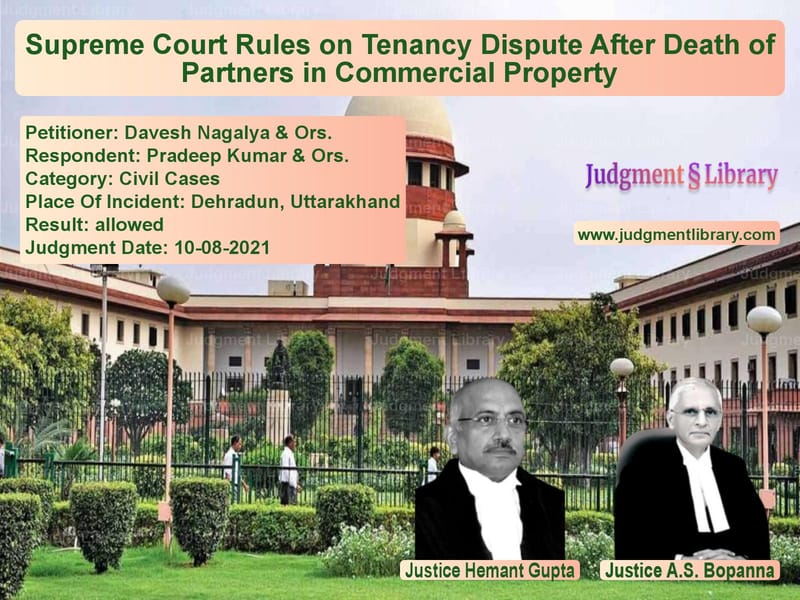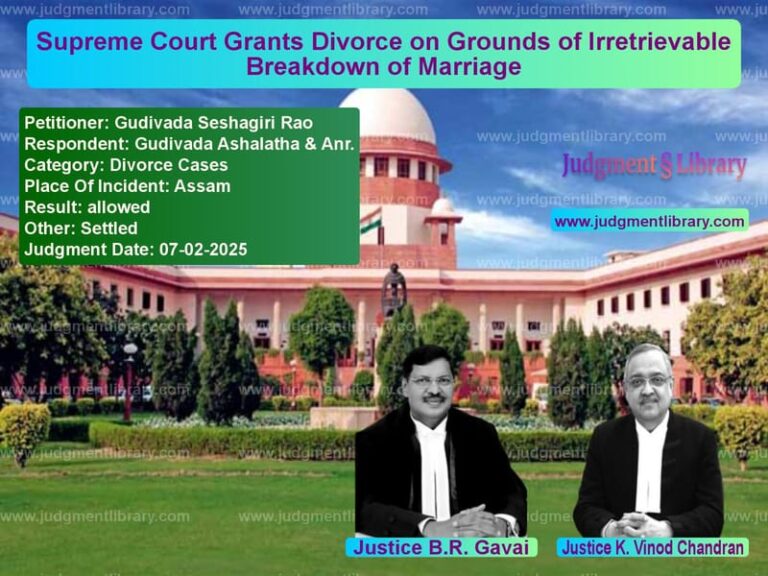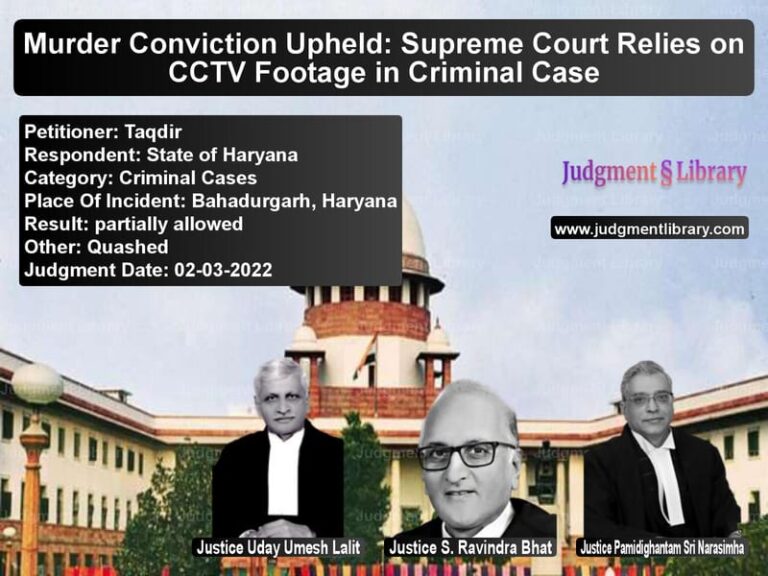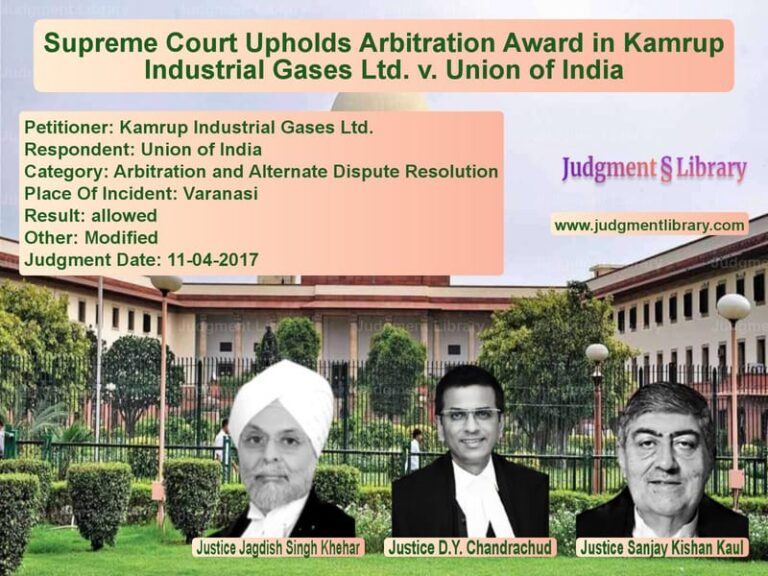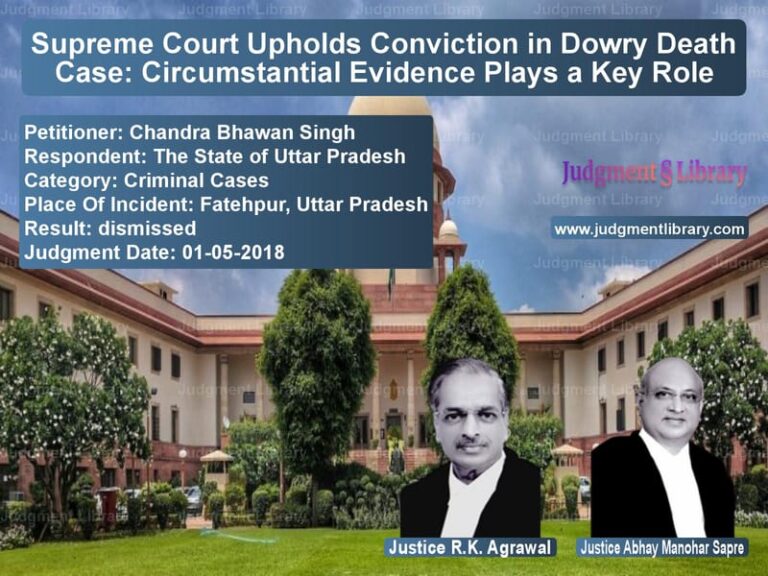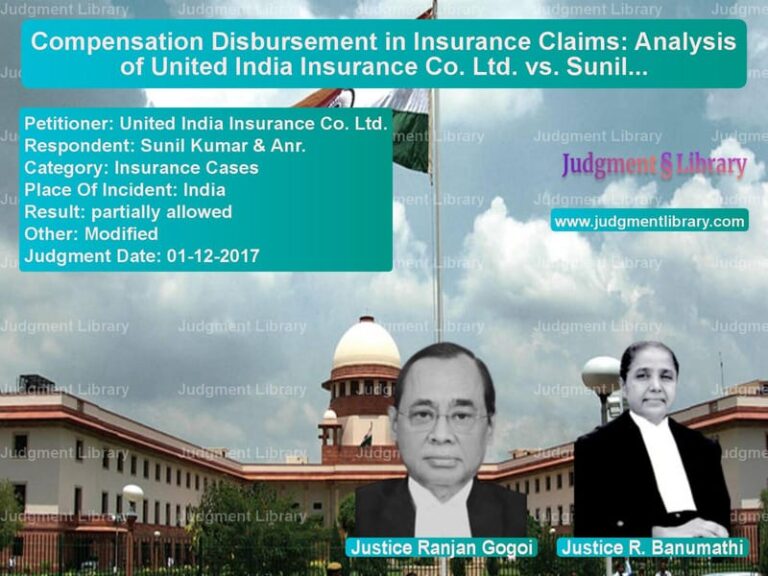Supreme Court Rules on Tenancy Dispute After Death of Partners in Commercial Property
The case of Davesh Nagalya (D) & Ors. v. Pradeep Kumar (D) Thr. LRs. and Ors. revolves around the issue of tenancy rights following the death of partners in a business that had been operating in a leased property. The Supreme Court ruled that the tenancy agreement was terminated due to the dissolution of the partnership by the death of the original partners, and the tenants were deemed to have ceased occupying the property.
Background of the Case
The dispute arose after the death of one of the partners, Pradeep Kumar, who had entered into a partnership with Subhash Chand in 1982. The tenancy was held by the partnership for a commercial property, and the question arose as to whether the tenancy continued after the death of the partners. The original tenant, Tika Ram, passed away earlier, and Pradeep Kumar, as the successor-in-interest, continued the tenancy with Subhash Chand. However, following the death of Pradeep Kumar on 21 May 2004 and Subhash Chand on 25 June 2014, the tenancy was contested by the landlord and the appellants.
The appellants, who were the legal heirs of Pradeep Kumar, argued that the tenancy should be deemed to have ended due to the death of the partners, as the partnership dissolved automatically under Section 42(c) of the Partnership Act. The landlord contested this and claimed that the tenancy remained valid, and the legal heirs of the deceased partners were still bound by the tenancy agreement.
Key Legal Provisions Involved
- Section 12 of the U.P. Urban Buildings (Regulation of Letting, Rent and Eviction) Act, 1972: The section provides for the deemed vacancy of a building when a tenant ceases to occupy it.
- Section 42(c) of the Partnership Act: The section deals with the automatic dissolution of a partnership on the death of a partner unless the partnership agreement provides otherwise.
- Section 25 of the Act: Prohibits the subletting of rented premises without the consent of the landlord and the District Magistrate.
Petitioner’s Arguments
The appellants, representing the legal heirs of Pradeep Kumar, contended that:
- The death of Pradeep Kumar led to the automatic dissolution of the partnership as per Section 42(c) of the Partnership Act.
- The tenancy agreement became void after the dissolution of the partnership, and the tenant was deemed to have ceased occupying the premises under Section 12(2) of the U.P. Urban Buildings Act.
- There was no clause in the partnership agreement allowing the legal heirs of the deceased partners to continue the partnership, and therefore, the tenancy should end.
Respondent’s Defense
The respondent argued that:
- Despite the death of Pradeep Kumar, the tenancy was still valid as the landlord had continued accepting rent from the partnership for the property.
- The legal heirs of the deceased partners had a right to continue the tenancy under the provisions of the U.P. Urban Buildings Act.
- The partnership did not automatically terminate under the Partnership Act because the partners had agreed to continue the business under the same terms.
High Court’s Decision
The High Court had earlier dismissed the appellant’s review application on the grounds that the death of the partners did not automatically dissolve the partnership. It observed that the tenancy could not be considered vacated merely because of the death of one or both partners, as the legal heirs were still entitled to the tenancy under the U.P. Urban Buildings Act. The appellant then challenged this order before the Supreme Court.
Supreme Court’s Ruling
The Supreme Court ruled that:
- The partnership was automatically dissolved by the death of the partners under Section 42(c) of the Partnership Act, as there was no provision in the partnership agreement to continue the partnership after the death of the partners.
- The tenancy was deemed to have been vacated under Section 12(2) of the U.P. Urban Buildings Act since the partners were no longer alive to continue the business on the premises.
- The appellant’s argument was valid, and the tenancy had indeed ended upon the death of the partners, which made the building vacant by law.
Key Observations from the Judgment
The Supreme Court made several crucial observations in its judgment:
“The law is clear that upon the death of a partner, the partnership is dissolved automatically unless there is a provision in the partnership deed that allows the legal heirs to continue. Since there was no such provision, the tenancy also came to an end.”
The Court also remarked:
“Section 12(2) of the U.P. Urban Buildings Act clearly states that the tenant ceases to occupy the building when there is a change in the partners of a business, which means the premises are deemed to be vacant.”
Final Judgment
The Supreme Court allowed the appeal, ruling that:
- The tenancy had indeed come to an end with the death of both partners.
- The legal heirs of the deceased partners could not continue the tenancy as there was no provision in the partnership agreement allowing it.
- The appellants were entitled to the relief sought, and the tenancy had fallen vacant as a matter of law.
Impact of the Judgment
The ruling has significant implications for tenancy law, particularly in relation to partnerships and the continuity of tenancy after the death of partners. It clarifies that:
- Partnerships automatically dissolve upon the death of a partner unless the partnership agreement provides for continuation by the legal heirs.
- Tenancy rights are also affected by the dissolution of partnerships, and a change in the partnership can lead to the tenancy being deemed vacant.
- Legal heirs cannot continue a tenancy without express provisions in the partnership deed or the landlord’s consent.
Conclusion
The Supreme Court’s decision in Davesh Nagalya & Ors. v. Pradeep Kumar & Ors. provides clarity on the legalities surrounding tenancy rights in the case of partnership dissolution. It underscores the importance of clear provisions in partnership deeds regarding the continuity of tenancy and the rights of legal heirs. The judgment serves as a crucial reference for future cases involving tenancy disputes and the death of partners in businesses operating in leased properties.
Petitioner Name: Davesh Nagalya & Ors..Respondent Name: Pradeep Kumar & Ors..Judgment By: Justice Hemant Gupta, Justice A.S. Bopanna.Place Of Incident: Dehradun, Uttarakhand.Judgment Date: 10-08-2021.
Don’t miss out on the full details! Download the complete judgment in PDF format below and gain valuable insights instantly!
Download Judgment: davesh-nagalya-&-ors-vs-pradeep-kumar-&-ors.-supreme-court-of-india-judgment-dated-10-08-2021.pdf
Directly Download Judgment: Directly download this Judgment
See all petitions in Contract Disputes
See all petitions in Property Disputes
See all petitions in Judgment by Hemant Gupta
See all petitions in Judgment by A. S. Bopanna
See all petitions in allowed
See all petitions in supreme court of India judgments August 2021
See all petitions in 2021 judgments
See all posts in Civil Cases Category
See all allowed petitions in Civil Cases Category
See all Dismissed petitions in Civil Cases Category
See all partially allowed petitions in Civil Cases Category

